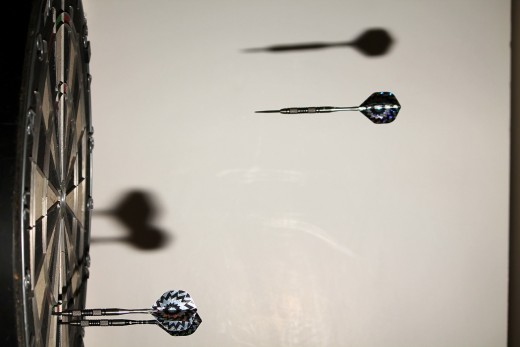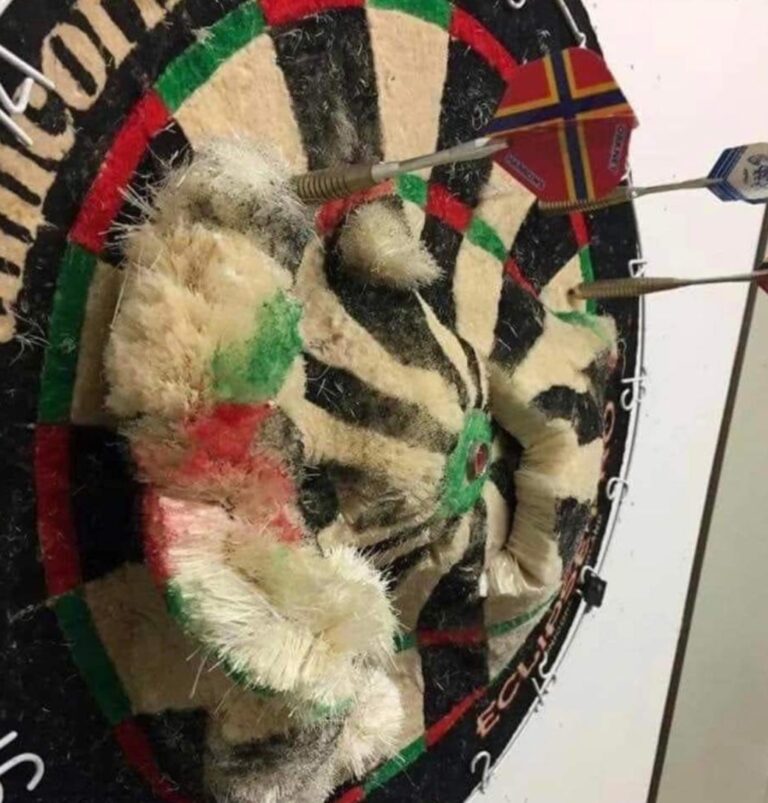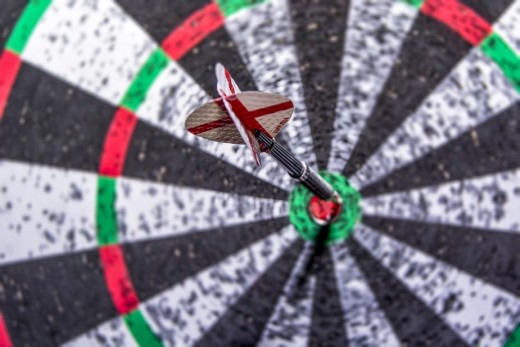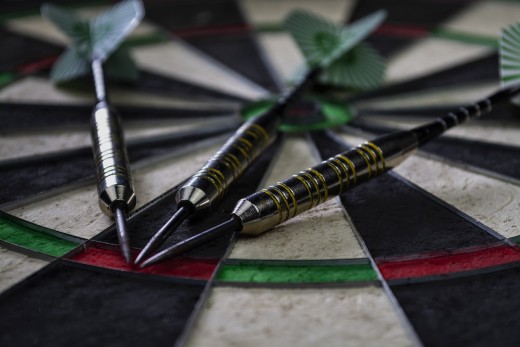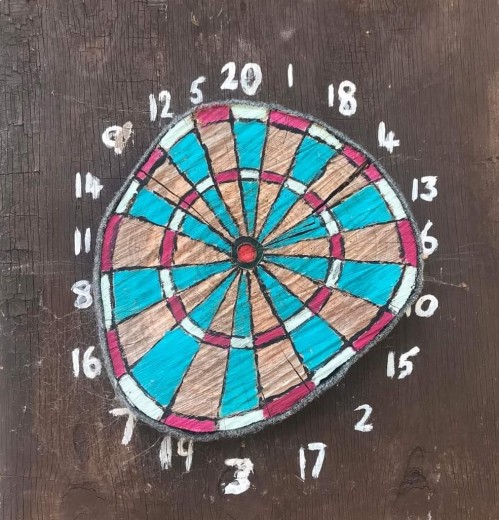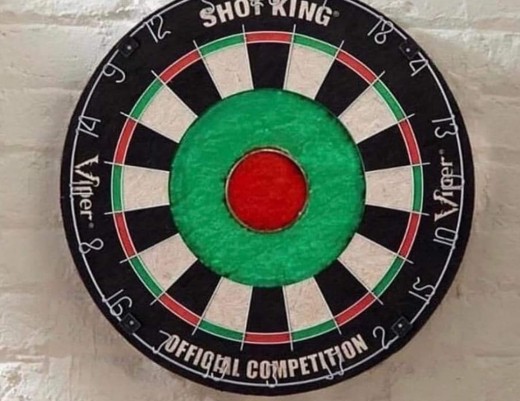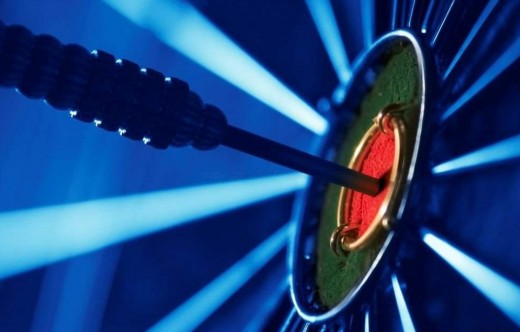Tuesday, September 25, 2012
Column 438
It’s time to wake up and smell the plastic!
Thanks to the Horizon Darts (Horizon Darts) ladies, Terry Maness and Melody Foster – two great business women with the smarts to sponsor Darin Young and Stacy Bromberg and the extra smarts, despite my repeated requests and their excellent qualifications, not to pose for Dartoid’s World Double Out shots, I have just completed a well-equipped visit to Thailand – and witnessed the FUTURE OF DARTS.
Winston Churchill’s admonishment in the next paragraph notwithstanding, long time followers of Dartoid’s World will be familiar with the bumpy (and grumpy) road this one time steel-tip purist has traveled since the early days of the soft-tip game…
“If we open a quarrel between past and present,” wrote Churchill, “we shall find that we have lost the future.” The British Bulldog was right – and so was Mr. Maguire (Walter Brooke) when he pulled Benjamin Braddock (Dustin Hoffman) aside for a private conversation in The Graduate:
Mr. McGuire: I just want to say one word to you – just one word.
Ben: Yes sir.
Mr. McGuire: Are you listening?
Ben: Yes I am.
Mr. McGuire: Plastics.
Ben: Exactly how do you mean?
Mr. McGuire: There’s a great future in plastics. Think about it. Will you think about it?
Ben: Yes I will.
Mr. McGuire: Shh! Enough said. That’s a deal.
“Plastic gives me a rash,” I once wrote.
“Never in a million years will I drop a quarter to play a child’s game.”
“Oversized doubles, triples, and bulls – give me a pool table with pockets the size of basketball hoops and I’ll be world champion by dinnertime.”
Handicapping, the freeze rule, bounce outs that count (“Give me a rock and I’ll score a maximum every trip to the line”), machines that flash and beep (“like gaudy Vegas slots”) and tell you where to throw, tips that bend and break… my criticism was incessant.
I have been wrong. Dead wrong.
Despite the marketing genius and deep pockets of the Professional Dart Corporation’s (PDC) Barry Hearn and Company and the brilliant 100+ averages of the top handful of steel-tip professionals in the world, they and all steel-tip purists worldwide are living in the past and the present – and completely missing the future that is now.
Short format or long format, there is a monumental difference between hitting what you throw at the majority of the time, as the top professionals do, and winning – and missing just once, and losing. The former is the past and present – the legacy of Eric Bristow, John Lowe, Phil Taylor and the rest. The later is the reality of soft-tip. It isn’t easier. It’s more difficult.
It’s time to wake up and smell the plastic.
The future is the soft-tip game.
I’m so guilty of missing the obvious – of being so caught up in my own quarrel between the past and present – as I prepared recently to travel to Bangkok to check out DARTSLIVE honcho Steve Ngu’s newest iDarts Club (Shop A123, Park Lane, Sukhumvit Soi 63, Ekkimai) I found myself ill-prepared. Although, thanks to DARTSLIVE’s Rob Heckman, I own a set of soft-tip darts, I discovered that I had only the three tips that came with them. Being that it was a Friday and I was to depart on Sunday I was in a jam.
So I called the Horizon Darts ladies. Without hesitation they graciously Federal Expressed a small bag of L-style tips. What incredible service.
I arrived at the iDarts Club at 9:00 p.m. the following Wednesday. Never in all my years in darts, stops in seedy bars in some 90 countries, and 17 years of writing about my experiences have I encountered such a mesmerizing darts environment. The club packs all the energy and pizzazz of a world championship final in a relatively compact, shiny, neon-accented two-story restaurant-sized room. Music pounds, beer flows, the crowd is young and new to the sport – anxious to learn. The contrast with the past and present is overwhelming.
My friends Johnny Witkowski, Jayke O’Reilly, and Damian Hardy were greeted at the door by DARTSLIVE Thailand’s CEO, Andy Ho. Ho is friends with DARTSLIVE founder and owner, Steve Ngu who I met in Sacramento in February. After two days of presentations and long conversations with Heckman, Scotty Burnett, Scott Kirchner, David Irete, and Paul Lim I left the west coast mind boggled with the DARTSLIVE system, high-tech SEGA-driven machines that are networked globally so you can compete against friends all over the world – and which maintain individual statistics and leader boards – plans for iDart clubs in numerous countries, The World and Dragon tournaments, and so much more.
But most of all I was struck with the DARTLIVE philosophy…
Darts should be fun, said Ngu. Simple. But profound.
Darts enthusiasts talk constantly about what’s wrong with the game, why it’s been in decline, why Americans (and pretty much anybody outside of the United Kingdom) can’t compete on the world stage. We need sponsorship. We need to be on television. We need sex-appeal. We need characters. We need new blood. We need to run things like a business.
Well, Steve Ngu and his crew and their growing stable of DARTSLIVE sponsored players – from Paul Lim to three-time world champion John Part to Ray Carver, Darin Young, David Fatum, Randy Van Deursen, Benjamin Dersch, Burnett, Kirchner and Heckman – and probably others I have forgotten or am unaware of – are bringing all of this to the sport and they are bringing the fun back.
It’s working.
It’s working because these guys understand the sport, understand that it’s changing, understand that it’s been changing, have earned their way, know what is needed and what will attract new blood. They remember when they began. They remember when darts was fun.
The DARTSLIVE system isn’t based on some old school marketing scheme. They aren’t trying to grab headlines and sell product by sponsoring Manny Pacquiao, as Target Darts has done, or by promoting a rigged tournament as did the PDC in 2006 with its so-called World Series of Darts. The pairings were set up to ensure that no American had a chance in hell of winning the highly promoted $1 million prize (although John Kuczynski – good for him – gave them a first round scare by knocking off John Part).
The DARTSLIVE system isn’t based on good old boy relationships. They aren’t ignoring well established and respected new darts organizers, as the PDC has recently done by awarding Thailand’s Vichai Govandani “the exclusive right to stage a qualifying competition for the 2102/13 Ladbrokes World Darts Championship in the region of South East Asia, specifically including the territories of Thailand, Malaysia, Singapore, Vietnam, Lao, Burma (which has been called Myanmar – since 1989!), Indonesia, and Brunei.” It’s a laughable decision. Outside of his long-time buddies at Unicorn, few who know Govandani – including some of his closest former supporters in-country – credit him with anything recently but using darts to his personal advantage. In Thailand, Indonesia, Malaysia, and Singapore there were and are many far better choices to run this fall’s qualifiers. Attapol “Poppy” Eupakaree would have been an excellent choice in Thailand. Amin Bin Abdul Ghani would have done a smashing job in Malaysia.
The DARTSLIVE darts should be fun philosophy permeates the iDarts Club in Bangkok. From Ho’s enthusiasm to the helpfulness of his staff to the young crowd that burgeoned as the night became late one couldn’t help but be caught up in the rhythm. The joint’s alive. It has a pulse. It’s like a drug. My friends and I couldn’t pull ourselves away…
We played Count Up for hours. For a score of 700 or more one of the staff wandering among the dozen darts machines would present you a beer.
 Laughter would frequently erupt as a brand new player landed a scoring dart. I could feel the beginning of their addiction. Just like a two-dollar instant Lotto win leads to another small gamble, as the machine winked and whistled brand new players were pulled back to the line, over and over – and they’ll be back tomorrow and the next day and the next.
Laughter would frequently erupt as a brand new player landed a scoring dart. I could feel the beginning of their addiction. Just like a two-dollar instant Lotto win leads to another small gamble, as the machine winked and whistled brand new players were pulled back to the line, over and over – and they’ll be back tomorrow and the next day and the next.
More than any youth darts program, any filthy old bar where the established players trounce those giving the game a first try (and often don’t help them learn), and any televised or streaming Internet coverage of a tournament featuring the same couple of dozen players competing against each other just as they did the week before and the week before that, the iDarts clubs – and the machines in particular – sell the sport to the new blood the sport so desperately needs.
The DARTSLIVE system and crew understand and speak the language of a new generation.
But what the system also does – most notably via The World tournament and qualifying events – is speak to the professionals and professional hopefuls. Not all of them yet but there’s money to be made and rumors of massive amounts to be on offer in the future – and where there’s money the professionals will follow. The DARTSLIVE guys understand this too.
Last year John Part and Adrian Lewis competed. Despite five world steel-tip championships between them neither won.
The big names from Asia competed and most scored high in the 2011 point standings – players like Royden Lam from Hong Kong, Laurence Ilagan and Roland Briones and Jaypee Detablan from the Philippines, Natthakhom Daochan-ngan from Thailand, and Yuji Eguchi and Mitsumasa Hoshino and Sho Katsumi from Japan – just to name a few. All of these players are as well known in their own darting communities and region as the likes of Taylor, James Wade, Raymond van Barneveld and the boys are elsewhere.
But they aren’t ranked among the top in the world. Why?
It isn’t because they aren’t capable as being as competitive on the world stage as those who top the rankings. It’s because the system which is pretty much centered within a short radius of England is stacked against the players who don’t live and compete week in and week out within that radius. Unless a player like Canada’s John Part or Australia’s Simon Whitlock makes the commitment to travel or move to within that radius a player outside of Europe, no matter how capable, doesn’t have a prayer. Of course, this applies not only to the Asians but also to Americans like Larry Butler who shocked the pants off Dennis Priestley and all the Brits when he won the 1994 World Matchplay in Blackpool in 1994 (taking out the late Jockey Wilson among others en route).
It applies to Tom Sawyer, Chris White, Chuck Pankow, Robbie Phillips, Gordon Dixon, Steve Panuncialman, John Kuczynski, Darin Young and many more.
But enter DARTSLIVE. They have cracked this unfair system to bits. While developing new players from all around the world who are just learning the game they are offering legitimate opportunities to the more accomplished players from all around the world – from the chance to compete on equal terms within a fair system to decent paydays to sponsorship.
Will the best in the steel-tip world heed Winston Churchill’s advice and Mr. Maguire’s advice to Benjamin Braddock, stop looking down on the soft-tip game and enter the plastic fray? I suspect they will – when the prize funds increase. Currently it’s not to their advantage because they can pocket oodles week after week in their own backyards.
Will the best in the world dominate when they do compete? Time will tell but I doubt it. The world is bigger than just England. There’s massive talent all across this planet. Finally, all players have a fair chance to show what they can do.
From amateur to professional, from Asia to America – to Las Vegas this weekend for Stage 7 of this year’s The World qualifiers – DARTSLIVE has brought the fun back and created a new paradigm for our sport.
My bet is that it will be the standard in five to ten years time.
From the field,
Dartoid

